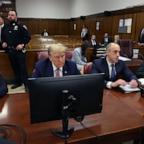Generation Engage Engages Its Generation
Generation Engage involves young voters in politics through creative technology.
June 19, 2007 — -- What came first? Young voter apathy or the cold shoulder from people in power? A grass-roots group connecting young Americans with their political leaders thinks it knows the answer.
"Young people do not suffer from a lack of interest. They suffer from a lack of access," said Justin Rockefeller, the youngest son of Sen. Jay Rockefeller, D-W.Va.
And so this fifth-generation son of one of America's most powerful families has teamed with Adrian Talbott, son of Brookings Institution president and former deputy Secretary of State Strobe Talbott, to engage youth in the nation's political discourse.
It's called Generation Engage, a nonpartisan civic engagement group founded shortly after the last presidential election in 2004, and the conversation is spreading.
Starting in New York, the group has branched out to Raleigh, Charlotte, Miami and, just this week, the Rockefeller-Talbott team is in San Jose to launch the latest incarnation of its mutual dream.
When asked why they founded Generation Engage, Rockefeller responded with one word: "Frustration."
"This frustration stems from the privileged background I have and I'm not talking about money. I'm talking about meaningful conversations about politics. I grew up discussing politics around the dinner table," Rockefeller told ABC News.
By becoming involved in Generation Engage, Talbott and Rockefeller are hopeful that politics will become more than just dinner conversation for the next generation. They are hoping that it will inspire all young people, but particularly those who do not attend college, to participate more and realize that their vote counts.
Cate Edwards, daughter of former North Carolina Sen. John Edwards, has joined the effort as well, serving as a board member of Generation Engage.
"It is obvious to me how there is a direct link between politics and people's lives, but few groups seemed to focus on young people who do not go to a four-year university or college. We decided to do something about it," Rockefeller said.




